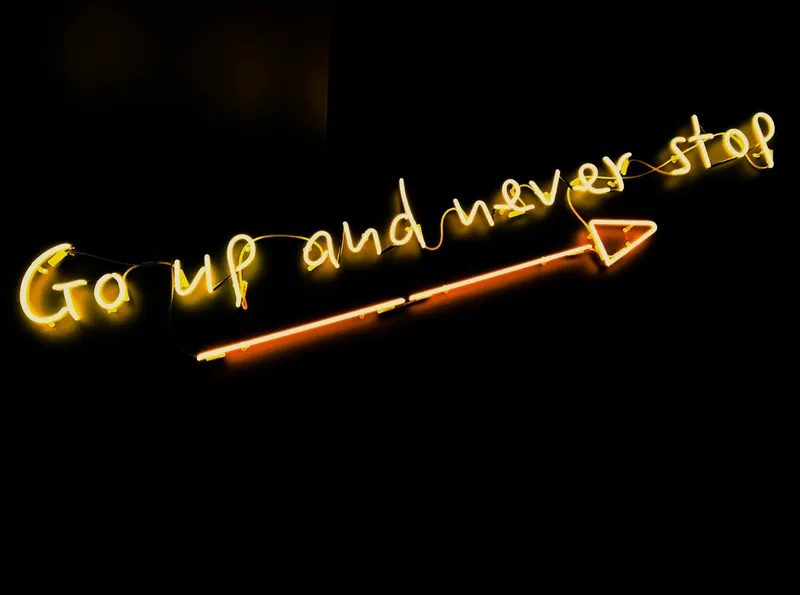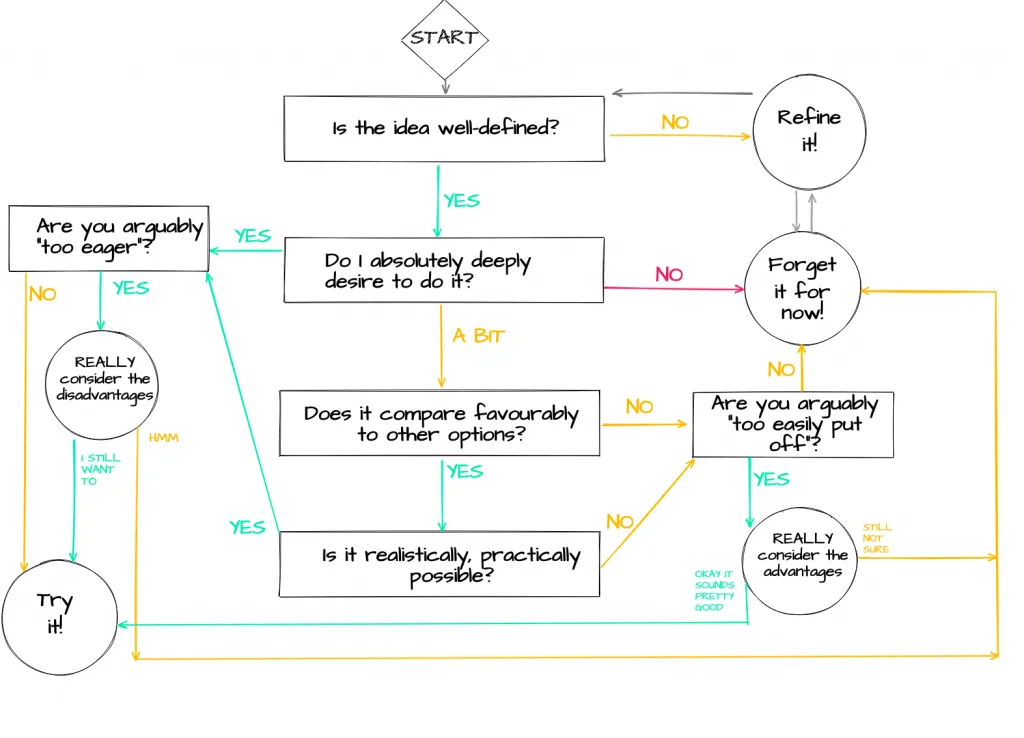Are Your Ideas Any Good?
What actually makes one idea better than another? Here are two tools to help you get clarity.
2 Jun 2023

I’d love to tell you that I’m not afraid of commitment, but I’ve rewritten this sentence a dozen times already and I doubt this will be the last.
But, I’m used to it. I’ve perfected the art of being paralyzed by indecision. And normally I’m stuck on major life decisions, so it’s nice to be impaled on something as simple as a sentence for a change.
Naturally, there’s more than one reason why I get stuck in these cycles of beginning to doubting to undoing and back to beginning again. (That’s right! I can’t even commit to a single underlying problem!). Sometimes it’s fear of changing my mind, or of failure. Often, it’s just plain old indecision.
But frequently I struggle with the very concept of comparing my options against one another. Trying to decide if I should work on this project or that project feels like being asked if Wednesday is better than July*. So I’ve been wondering… what makes one idea better than another?
*July is better, but that’s not the point.
The only way to be sure of choosing the best path is to see the future. But even without that skill, we can improve on guessing. My suggested tactic is to turn impossibly vague questions, like Is this a good plan? into a large number of more specific questions, like How many hours a week can I realistically devote to this?
To make that process more concrete and accessible, I’ve compiled a list of questions and a flowchart, both of which I hope you will find useful when assessing your own ideas.
Tool One: Questions
The instructions are simple: ask yourself some questions about each idea you’re trying to choose between, add up the associated points, and compare both the point totals and your emotional reaction. This isn’t purely about the result—the process is just as important. Tapping into your gut feelings while rationally assessing the material and psychological impacts of an idea will inform your decision making, no matter what ‘score’ you end up with.
As you ask yourself these questions it will surely occur to you that they are not quite relevant, or that you disagree with the weighting, or even that the weighting ought to be the other way around.
For example, perhaps you’re desperate for a tougher challenge, in which case you’d prefer to subtract points for easy ideas and add them to harder ones. That’s perfect! This isn’t an objective assessment; it’s an entry point into your own personal evaluation. Change the points as much as you like, so they fit you and your life!
It’s also worth remembering that every answer is a function of time. In other words, your assessment can only ever be accurate as a snapshot of a particular moment. Which is also great! Life would be very boring if our desires didn’t change and evolve.
Personally, I advise against worrying about that too much in advance. When paralysed by indecision, it’s better to make progress on something than nothing. What if I change my mind later? isn’t a good reason to ignore your mind right now.
With that in mind, let’s get into the questions. Run a couple of ideas through, and see what comes out with a better point total!
| Question | Yes | No |
| Does this idea thrill me in a deep, inexplicable manner? | +3 | 0 |
| Will pursuing this idea be fun? | +1 | -1 |
| Will I still want to pursue this after the initial fun wears off? | +2 | -2 |
| Will pursuing this idea be easy? | +1 | 0 |
| Is there a guaranteed payoff of some kind? (Financial, new skills, new people) | +1 | -1 |
| Is there a potential of a very high payoff? (Financial, new skills, new opportunities) | +2 | 0 |
| Is there a high cost of failure? | -3 | 0 |
| Is the time investment short? | +2 | Subtract a suitable amount of points for the payoff versus time investment |
| Will I have to give up a lot to do this? (Use your judgement of where certain sacrifices lie along the spectrum.) | -3 | +1 |
| Is this idea very similar to a project I’m currently working on? | -1 | 0 |
| What level of friction is there? | None: +2 | Minor difficulties: -1 Major institutional opposition: -3 |
| Is there a good reason to do or not do this, that hasn’t been mentioned yet? | +1 per reason to do | -1 per reason not to do |
There are a few potential outcomes, depending on your point totals:
-
An obvious winner, and you’re happy with it. Easy.
-
An obvious winner, and you’re not happy. Interesting. At least this gives you some additional input into that process. Why are you unhappy with this winning idea?
-
No obvious winner, but some obvious eliminations. Progress!
-
No obvious winner, no obvious eliminations. Oh well. It would be surprising if a single table from the internet could solve all potential situations. But even no obvious result is still a result – maybe there’s no right answer, or you’re in the happy situation of choosing between good options.
If you’re still lacking clarity, then perhaps this second idea will help.
Tool 2: A lovely flowchart
But perhaps answering a bunch of questions and adding up numbers doesn’t feel very fun at the moment. Luckily, this is why humans invented flowcharts!
Perhaps this flowchart will succeed where the questions failed. It takes the most important factors—things like Do I want to do this?, Does it vaguely seem like a good idea?, and Is it actually possible?—as well as considering the effect of personality. If you are generally overeager or overcautious, it can be helpful to build in a counterbalancing step into your decision-making process. Some people will use any excuse to jump into something new and would benefit from a little more caution, while others are over-cautious and perhaps need to reflect more on the positives to break free of paralysis.
Pick an idea, start at the diamond, and see where you end up:

Of course, just like the list of questions, this flowchart is not infallible. These are tools for feeding our intuition, not replacing it.
Just like if you weren’t happy with the winner of your points totals, if you reached “Try it!” and got a sinking feeling, then you have discovered some useful information about your true desires.
Life isn’t about optimisation
In the end, there’s no perfect way to make decisions. And there shouldn’t be! There’s nothing wrong with choosing the most interesting direction instead of the most optimal path. But whatever you desire to obtain from your next idea, I hope these tools can help you make a decision.
Download the Questions & Flow Chart
If you found these tools helpful, feel free to download them as a PDF so you can return to them any time!
This article was originally written for Puttylike

Neil Hughes is the author of Walking on Custard & the Meaning of Life, a comical and useful guide to life with anxiety, and The Shop Before Life, a tale about a magical shop which sells human personality traits.
Along with writing more books, he spends his time on standup comedy, speaking about mental health, computer programming, public speaking and everything from music to video games to languages. He struggles to answer the question "so, what do you do?" and is worried that the honest answer is probably "procrastinate."
He would like it if you said hello.